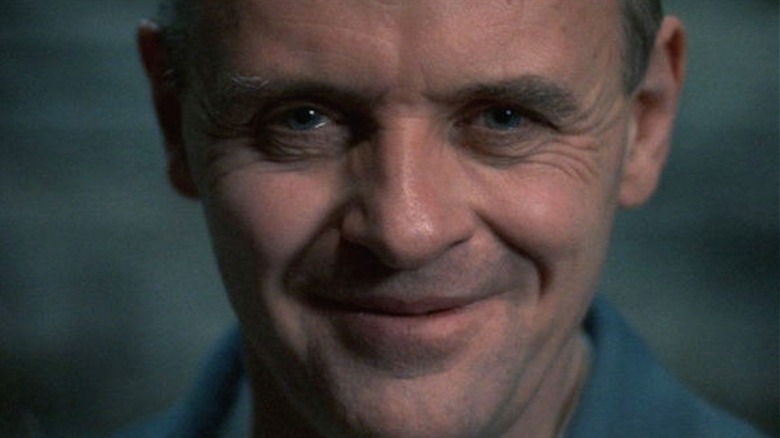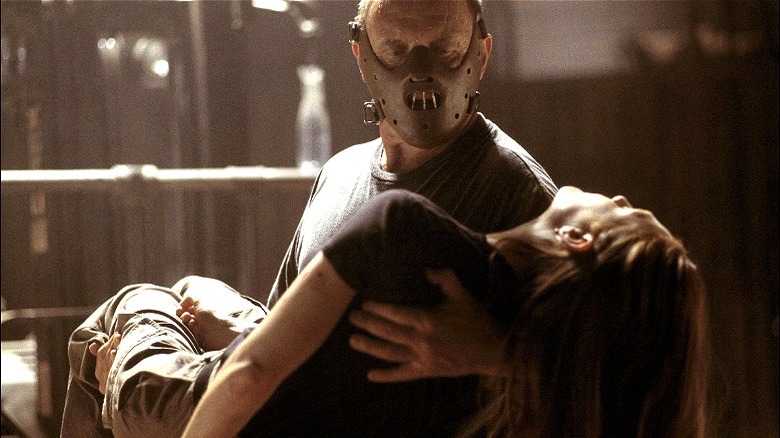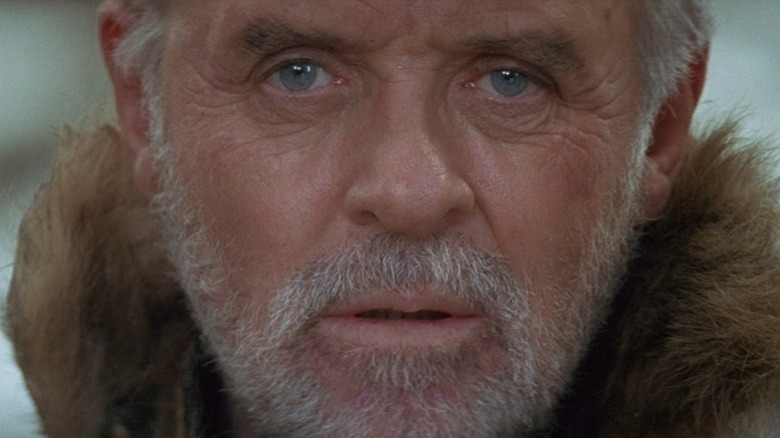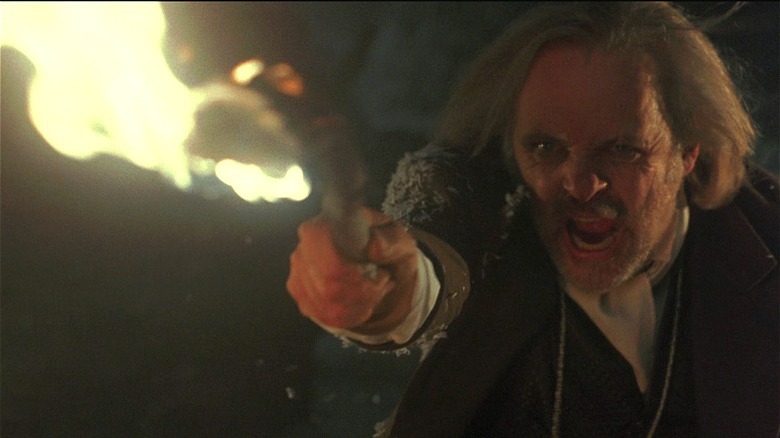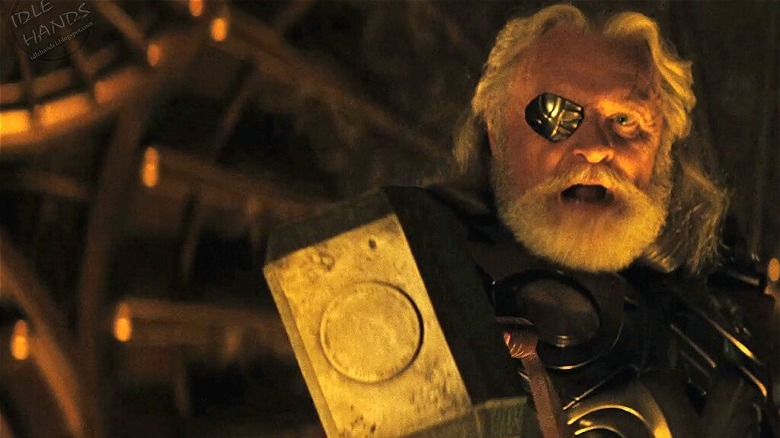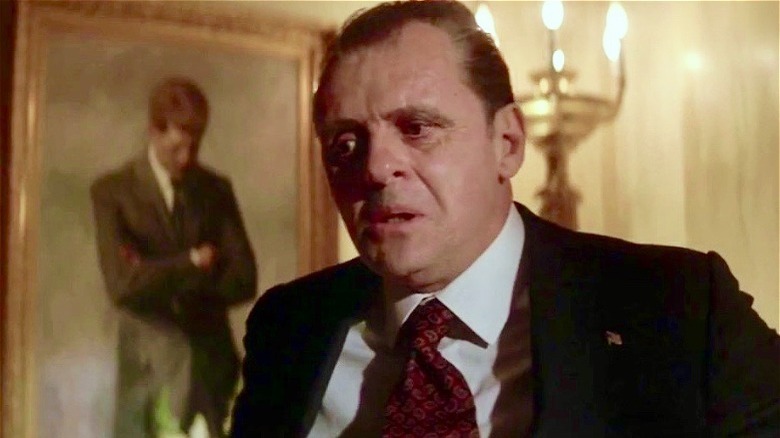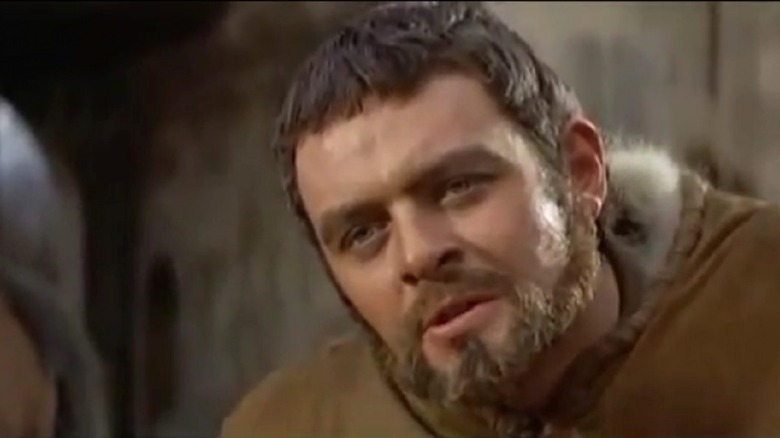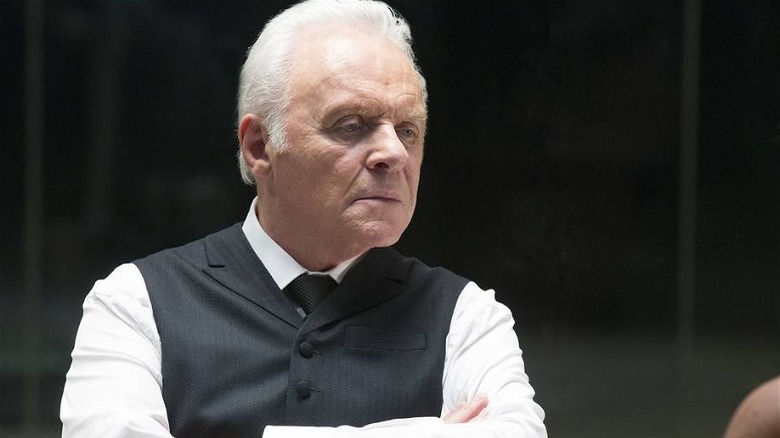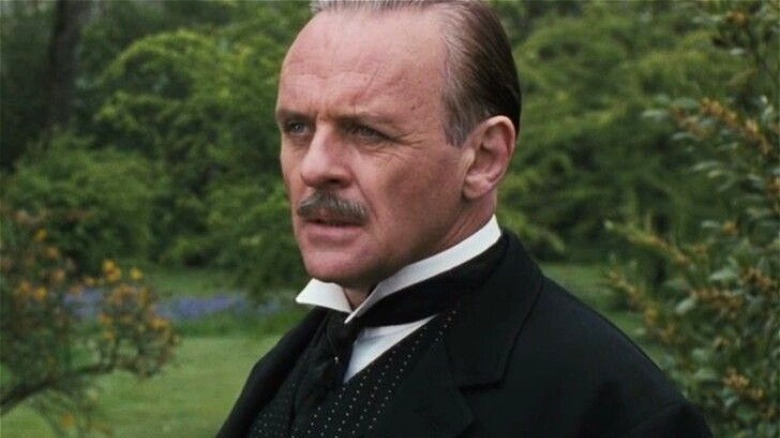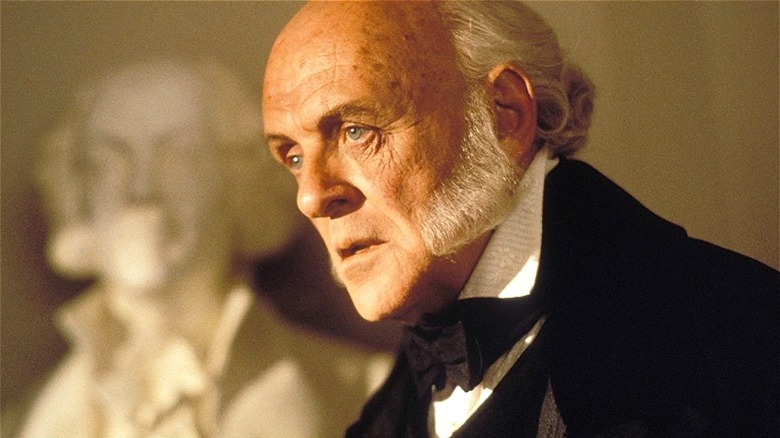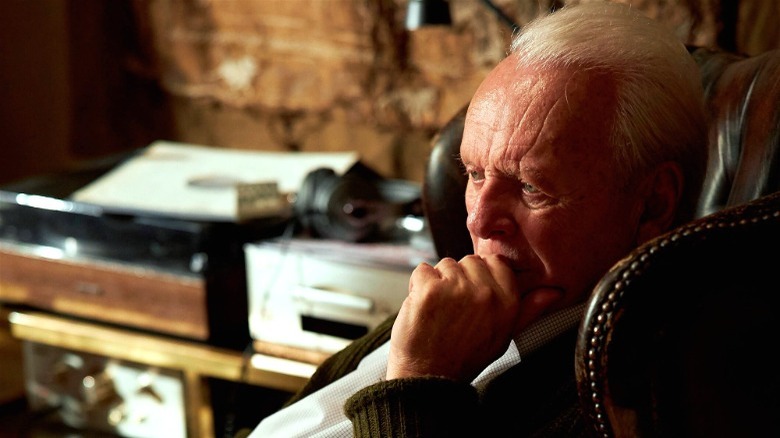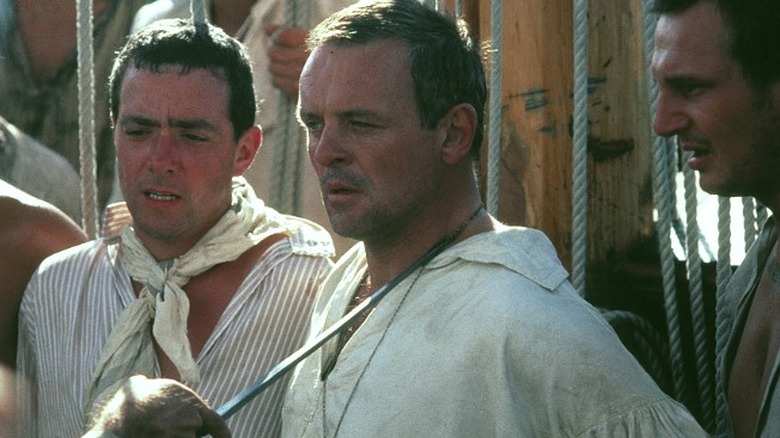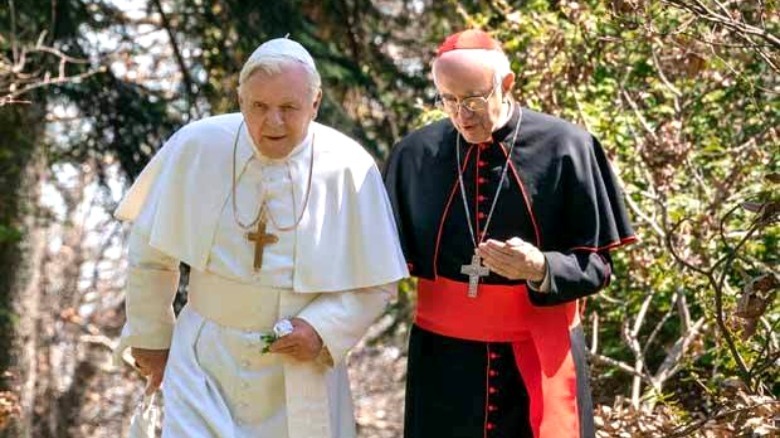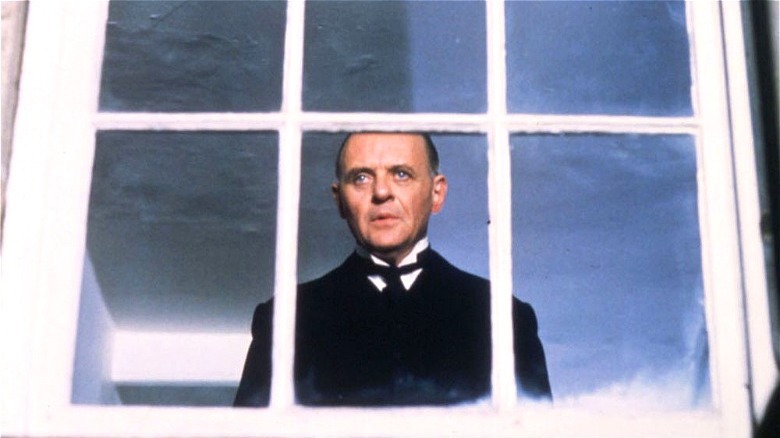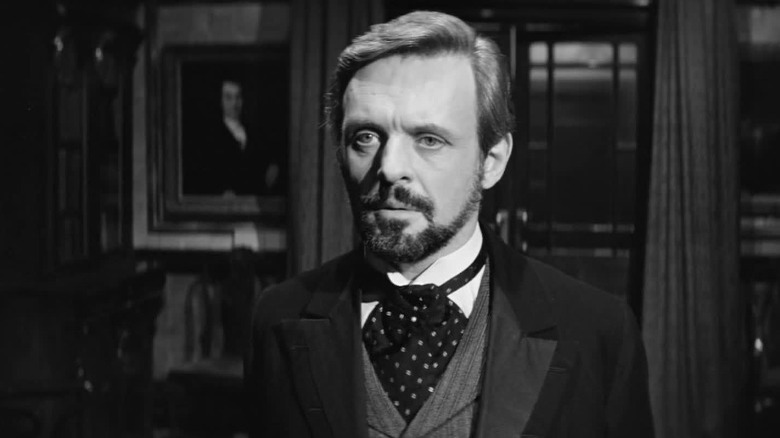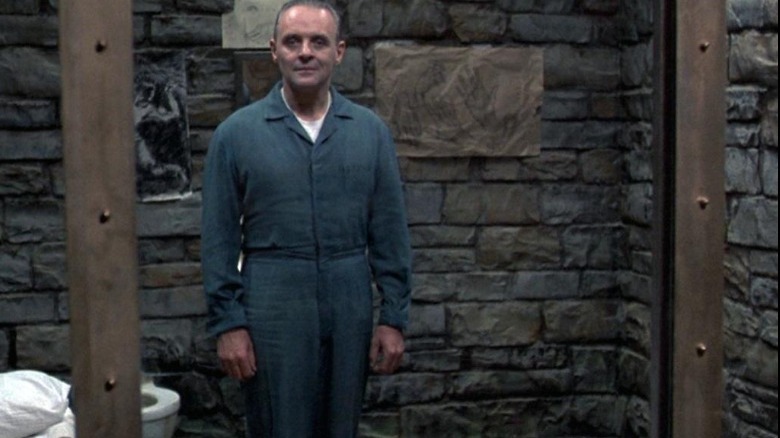The 15 Best Anthony Hopkins Roles Ranked
Sir Anthony Hopkins isn't a man that requires much introduction. He's one of the finest actors of his generation, breaking into the mainstream with his portrayal of the villainous Hannibal Lecter. However, his talent was noticed decades before "Silence of the Lambs," and he shined in roles like Richard the Lionheart and the paradoxical Captain Bligh. What makes Hopkins special isn't pretension or devotion to his craft, though. He's simply a consummate professional.
Sir Tony is a funny, forthright man who tweets videos of himself playing the piano, and he's not above taking roles for the sheer hell of it. 1992's "Freejack" lets Hopkins chew up the cyberpunk scenery and hang out with Mick Jagger. "The Rite" is a ferociously Catholic horror movie with a slow-motion plot. The film is a dog, but Hopkins has never phoned in a role in his life.
The point is, nearly any performance by Hopkins will be a good one. These are his 15 best, but almost all of them are great places to start watching a master at the top of his game.
15. Dr. Hannibal Lecter — Hannibal
The Lecter of Ridley Scott's "Hannibal" isn't the man he used to be. The news that author Thomas Harris was writing a sequel to "The Silence of the Lambs" set off a flurry of preparation, and there was no doubt that Jonathan Demme would return to direct. And then the book dropped, causing Demme, Foster, and others to scatter after they got an eyeful of its ending. When the smoke cleared, Hopkins remained, for what is Hannibal Lecter without the man who made him immortal?
There's half a good movie in "Hannibal," and the rest still contains a delicious performance from Hopkins. The book's ending is altered; instead of a grotesque happily-ever-after between a brainwashed Clarice Starling and Lecter himself, Lecter returns to a life on the run, minus a hand. It's not exactly better, but it spares the audience the worst of the novel while giving Hopkins a chance to offer his teeth-chattering best. All told, the movie is about as good as it can be. Magnificent settings and Hopkins given free reign make Lecter as enjoyable as ever, despite some authorial hurdles that didn't need to exist.
14. Charles Morse — The Edge
Deep down, everyone wants to watch a classically-trained actor go toe to toe with a man-eating bear. It's even a plot point in Shakespeare's "The Winter's Tale," with a scene in which a baby-abandoning loyalist exits the stage, pursued by a bear. A shame that Hopkins has never performed in this First Folio comedy, but 1997's "The Edge" more than makes up for it. Bart the Bear is Charles Morse's gruesome foil, a fat and happy Kodiak who'd become something of an industry legend. Together they make an odd couple, terrifying on screen, friendly between takes.
Hopkins gives this cheeseball movie the weight it needs to be more than mere popcorn fodder. His fateful connection with the wild bear feels symbolic, lethal yet fair. Survive its trial and Morse will have learned something valuable about being human and alive. Fail, and he's just another Sunday brunch for the big fella. Alec Baldwin is technically in this movie, another antagonist with greedy motivation, but the real meat is between Hopkins and the brutal, uncaring force of nature.
13. Abraham van Helsing — Bram Stoker's Dracula
Francis Ford Coppola can get great performances out of nearly anyone, and his gonzo take on "Dracula" is no different. Some of the casting is all over the place, with an inexplicable Keanu Reeves doing his best. He survived "Dangerous Liaisons," sure, but Hollywood hadn't yet learned to leave him to the Way of the Wick. But it's Anthony Hopkins who, in coordinated opposition to the always-on Gary Oldman, gives "Dracula" the support structure it badly needs. It's not a great film, but in Hopkins it got a terrific Van Helsing.
Hopkins' take on Van Helsing is clearly drawn from the original archetype of a cantankerous yet sage master of the parapsychological arts. But this version adds an eccentricity that Van Helsing rarely shows, an intimation of the accruing psychic damage the vampire hunter must labor under. No one can remain completely sane when there's a strong chance they'll have to slay their own friends and allies, and Hopkins gives Van Helsing that depth while dragging the confused and grieving klatch of suitors into their final confrontation with Dracula.
12. Odin — Thor
Anthony Hopkins made the role of Odin his own, despite a few hurdles that slow down the film. Helmed by Kenneth Branagh and an early member of the nascent Marvel Cinematic Universe, "Thor" blended the theatrical with some slapstick. It's all silly and a little Shakespearean, and Hopkins understands the assignment.
Odin is an authoritarian presence in golden Asgard, a god-king whose rigidity and power left deep scars behind. His secrets have secrets, and though he loves his family, he's also bogged down by the need to ensure Asgard's future. Hopkins plays off of his on-screen sons like a Wimbledon match. Hemsworth's Thor earns fatherly disappointment and pride in equal measure, and the love and fear Hiddleston's Loki feels for man that raised him is reflected back at him. Odin's sons are the result of his actions; one has his kingly power and pride, the other his secrets and doubts. It all feels like it matters, because Anthony Hopkins makes it matter.
11. Richard Nixon — Nixon
At some point, Oliver Stone lost the plot. The controversial yet brilliant director was in the first stretch of his downward slide when he chose to make a film about Richard Nixon, and the resultant box office bomb marked his quickening descent. Stone never let go of his conspiratorial obsessions — here, Nixon ruminates on whether or not the beleaguered president-to-be helped put the assassination of JFK into action. "Nixon" is nonsensical stuff, a fever dream of a movie that survives solely due to its performances.
Hopkins is not going for an accurate portrayal of Nixon here, though his hunched physicality summons the right ghost. There's a sense that the actor privately realized that this film was destined to become pure camp, a platform for Stone's warped notion of Nixon as a man in thrall to the great beast of politics. His portrayal of Nixon is barely to the left of the head-in-a-jar version seen on "Futurama," a capital-C Character, the new-minted archetype of an evil yet honorable politician. Hopkins struggles to ground a movie built on ether and intimation, and despite it all, he succeeds.
10. Prince Richard the Lionheart — The Lion in Winter
1968's "The Lion in Winter" is one of Sir Hopkins' earliest roles. It's Christmas, 1183, and the strife between Queen Eleanor, King Henry II, and their small family could be a Kardashian-style mess — except that Henry can push around the Pope when he decides it's time for a divorce. Hopkins plays the eldest of Henry's three sons, the one who will one day be famous for his exploits in the Third Crusade, and the one who usually arrives to aid Robin Hood against Prince John in modern versions of the legend.
"The Lion in Winter" sets up a fraught dynamic between the trio of potential heirs, and Hopkins contains the duality of the lion whose name he shares. He's imposing and powerful, but secretly he's easily moved by his sensitivities. The twist that puts him in Dutch with his father and the Duke of Anjou drives him to anger when the King denounces all three of his children. His role is small compared to Hepburn and O'Toole's titanic struggle, but Hopkins makes himself heard nonetheless.
9. Dr. Robert Ford — Westworld
HBO's "Westworld" shares very little DNA with its movie predecessor, but that works to its benefit. The premise is similar, but now the ethical and moral depths of the parks are explored. It's all as grotesque and layered as one could want. Hopkins was tapped to play the park's senior story developer, the man who releases a dangerous update to the park's hosts for complex reasons. It's a dense plot with tangled strings, and it compels by the strength of its cast. Sometimes by that strength alone.
It's probably a coincidence that the critical response to the series took a dip in its third season, the first to not feature Hopkins at all. The cast retains its power, but the plot loses its cohesion without the park's creative director at the helm. Hopkins' role in "Westworld" wasn't huge, and it would be grossly unfair to ignore the quality of his co-stars, including Jeffrey Wright and Thandiwe Newton. But Ford added something special to the troublesome parks. A little devilish flair, a little godlike ambition, and a desire to create true free will.
8. Henry Wilcox — Howard's End
Before we had A24, the Merchant-Ivory logo let movie fans know they were about to get something unique. James Ivory's films are typically small but luscious affairs obsessed with the minutiae of English classism. Three of them are adaptations of E. M. Forster novels, always seeking the human within the rigid structures of England's upper crust, and not always finding it. In "Howard's End," Anthony Hopkins takes the role of the Wilcox family patriarch, the man who embodies the estate itself. He's a stolid and unrelenting figure, but even he can't stand long against the changes of time.
Wilcox tries, though, and it's his brutal dedication to conservative ethics that slowly destroys the family. At every chance to find and show empathy, he shoves the opportunity aside. The stiff upper lip approach leaves Henry isolated, unable to honor the second woman he marries with the truth of what she should have been owed. It's heady, emotional stuff, and Hopkins' callous behavior gives costar Emma Thompson the chance to offer the performance of her life.
7. John Quincey Adams — Amistad
Anthony Hopkins excels at biography, and his turn as ex-president John Quincey Adams in Spielberg's "Amistad" is some of his best work. It's another small role in a stacked cast that includes Djimon Hounsou, Pete Postlethwaite, and Morgan Freeman, but Hopkins provides the necessary counterweight. As a former president, standing in opposition to Martin Van Buren and his bid for re-election on the back of this case, Adams represents America's glories and its flaws.
Adams doesn't commit to helping the abducted Africans until the Supreme Court appeal, a potent metaphor for how those with privilege only seem to help at the last minute. But when Adams does commit, he goes all in. He ruminates on human nature in a 10-minute showstopper, recognizing that the natural state of humanity is freedom, and that to force a human life into chains will be our downfall. Those chains will always break, says a passionate Hopkins. A person will fight his enemies, all for a chance to go home. It's a speech that demands to be heard. Freedom will win, eventually and inevitably.
6. Anthony — The Father
It's no fun to watch someone we love go through the fog of old age and become someone that we barely recognize. Dementia is one of the most brutal, heart-wrenching experiences human life has to offer, both for the victim and the victim's family and friends. It strips so much away from all of us. Yet love endures, despite the challenge and the heartbreak. The first trailer for 2020's "The Father" is framed like a horror movie told from the father's perspective, and brings the fear and loss of dementia home in a way that can't be ignored.
"The Father" is a difficult film to watch, because its reality is tangible. For Hopkins fans, the irony is painful, too — the actor's prodigious memory is one of his greatest strengths. Here he sets aside that gift in favor of expressions that show the depth of Anthony's anger, frustration, and confusion. It's a well-earned Academy Award for Sir Hopkins; few others could master this role so painfully.
5. Captain William Bligh — The Bounty
The story of the 1789 mutiny aboard the HMS Bounty has become a historical "Rashomon." It's always been unclear what prompted Fletcher Christian to rally the sailors against his former friend, William Bligh. 1984's "The Bounty" is an impressive but standard version of the story, with Mel Gibson as Lieutenant Christian and Hopkins as the increasingly tyrannical Captain Bligh.
The film nests their conflict in classic human emotion. The men of the Bounty grew accustomed to the freedoms of tropical life, and Bligh, the only commissioned officer on the merchant vessel, is happy to return to the formal structure of English society. The film splits its narrative after the mutiny succeeds, and each man's flaws lead them to pyrrhic victories. Fletcher might live free, but Bligh's stoic testimony ensures that his mutineers can never return home. It's a glimpse of Hopkins in the years just before he became a star, and his performance proves that his rise was simply a matter of time.
4. Pope Benedict XVI — The Two Popes
"The Two Popes" could be a film about two old men shooting the breeze, if it wasn't for the fact that modern Catholicism hung in the balance. Hopkins, as the former Cardinal Ratzinger elected Pope Benedict, grants this embattled retiree a humanity the public rarely saw during his tenure. For non-Catholics, Benedict is known as the face of the abuse scandal that rocked the Vatican. The film depicts Benedict's guilt and slow response as key to his coming resignation, and Hopkins gives this weighty issue its due.
"The Two Popes" is a strikingly human character study, although it never ascends past the illusions of fiction. The trappings of faith can't hide their true natures when the two men of God get to jawing the fat. There's a theme that we're all more similar to one another, and flawed, than we want to admit. Guilt weighs down both men, keeping them closer to Earth than they might like, and that's potentially more meaningful than living by faith alone. Hopkins is deft here, dancing with Jonathan Pryce through some remarkable yet rarely dry discussions.
3. James Stevens — The Remains of the Day
It's Merchant-Ivory again, so we know what that means. This time, "The Remains of the Day" is based on an award-winning novel by Kazuo Ishiguro. It's a mournful story about emotional distance and sacrifice, framed by the mistakes of war. Hopkins plays Stevens, the butler in charge of overseeing the day-to-day operations of Darlington Hall, and the rarified air of his employer keeps Stevens from entertaining his own thoughts and feelings. Hopkins again has the skills of Emma Thompson to contend with, and it creates a world of deep emotion barely hidden between them.
"The Remains of the Day" is a particular kind of love story, strung like a violin among the guilts Stevens carries as he serves his fascist sympathizer boss. Neither Stevens nor Thompson's Miss Kenton are free to be who they wish, only who they must pretend to be within the Hall's structure. Kenton eventually frees herself and finds a life without Stevens, and the loss weighs so clearly on Hopkins that the film transcends the medium. The only reason this lovely film didn't sweep the awards season is a good one: Stevens' poignant lost love couldn't compare with the overwhelming human horror of "Schindler's List," but don't think that makes this a lesser film.
2. Dr. Frederick Treves — The Elephant Man
"The Elephant Man" is the most sensitive movie in David Lynch's repertoire, mingling his taste for surreal visuals with the relentless humanity and kindness of a young man trapped in his traitorous body. Joseph Merrick lived and died as an example of the best of us, and he lived and died at the mercy of us at our worst. Hopkins, as Dr. Treves, does what he can to build protections around Merrick, but he's burdened by the fear that it's not enough. Unfortunately, he's correct.
Hopkins helps to elevate Merrick's soul throughout the film, never drawing the scene away from its star yet adding a gentle face that we're capable of empathizing with more easily than poor Merrick's. He teaches us to see Merrick as a man, a success despite the betrayals that compound on them both. It's Treves that gives Merrick his last day, the father figure he needed, and an accidental psychopomp as the spirit of Merrick's mother comes to take poor Joseph home.
1. Dr. Hannibal Lecter — The Silence of the Lambs
Jonathan Demme's "The Silence of the Lambs" is one of the finest modern crime thrillers and a horror film that delves into the terrifying depths of the human psyche. Hopkins is perfectly cast, of course, but the greatest thing this blockbuster role did was ensure we'd get more performances from Hopkins for decades to come.
Lecter himself is as beautiful a character as possible; meaty, charming, and genteel. It's hard to square the horror of him with his fine bearing, yet that's his most realistic aspect. Hopkins performs the role without pretension, and the noble aspects of Lecter feel natural. His amusement with Clarice Starling grows into a mild respect, a change that shows in his body language and his willingness to delve more deeply into her mind.
Lecter doesn't waste time with that which doesn't interest him, so his acceptance of Clarice is loaded with implied meaning. The respect she's earned is obvious. It makes the turns of "Hannibal" all the more baffling, but with Hopkins closing the cycle, all of Hannibal Lecter's big screen career remains a joy to watch.
